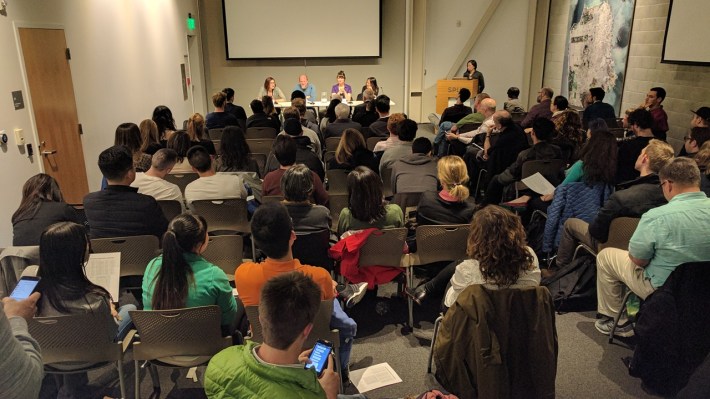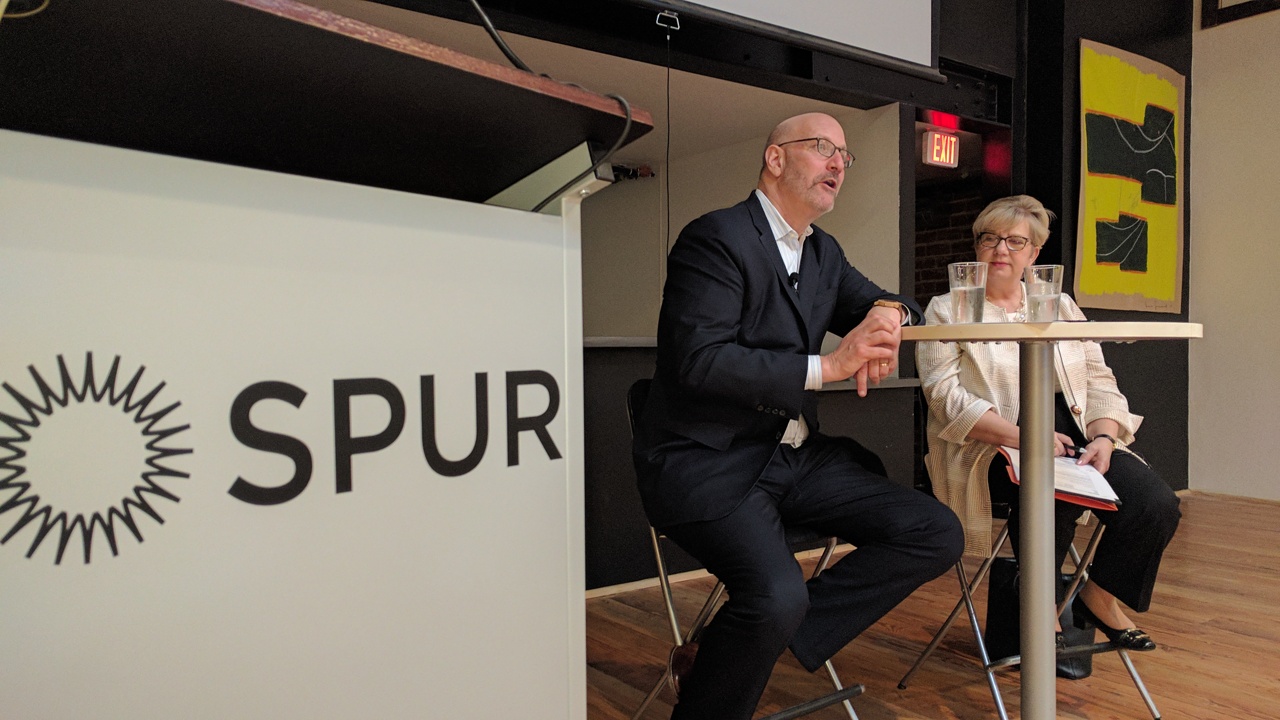Last night, the San Francisco Bay Area Planning and Urban Research Association (SPUR) and Young Professionals in Transportation hosted a talk and discussion about bike-share and the transportation changes taking place in our cities. The event, which was held at SPUR's Oakland location, featured Jay Walder, the CEO of Motivate. One of many items that stood out: Walder said that Bay Area Bike Share, which Motivate operates, will definitely work with the Clipper card. "We will have it integrated into the transit system," said Walder. "It should be as simple as using BART or Muni or any other part that uses Clipper."
As Streetsblog readers may be aware, Walder was previously CEO of Hong Kong's transit company, Chairman and Chief Executive Officer of New York's MTA, and was an executive at London Transport. He knows a thing or two about big city transportation. "I've had great pleasure running some of the largest transit agencies in the world," he said during his opening speech. "And I really do believe that bike-share is one of the most innovative things we're seeing in urban transportation today." And as readers know from previous posts, the Bay Area is poised for a huge bike-share expansion. "Late in the spring we will deploy 7,000 bikes in the bay area. Today we have 700," he said.
He talked about the history of transportation and urban development, and how in the past big, fixed-guideway transit construction dictated the way cities grew. "It's pretty clear that 100 years ago as cities were being defined, cities grew around transit infrastructure," he said. But that's something he sees changing very rapidly "What I love about what's going on with bike share is that it is breaking a lot of the mold of what we have."
Given the arduous and long process of building transit--he talked about how the Van Ness BRT project took 20 years to plan and the 2nd Avenue Subway in New York took a half century--it's impossible for traditional transit to keep up with urban growth. "The reality is people are finding new ways to be able to deal with mobility challenges. They're looking for solutions that can be implemented now, not solutions they are planning for 20 years from now."
He argued that bike-share combines the best of mass transit, with the convenience of private ownership "Bike-share is not evolutionary, it's revolutionary. It's the first time we've thought about a transit system that says: you go, you decide where you want to be. It's personalized mass transit."
Of course, as a former executive at three of the world's biggest urban rail networks, he remains a proponent of subways and big rail projects. But he sees bike-share as enabling transit to work better. And he's not just talking about so-called last-mile problems. In New York, he explained, bike share use patterns continually surprised them. Rather than riders grabbing bikes to get to and from subway stations, sometimes they find riders going between points they never anticipated would be popular routes. "Some of the data we've seen is completely counter-intuitive. You see origins and destinations you didn't expect," he explained.
But the strength of bike-share, he added, is that it's easy to add a station if usage patters seem to indicate a demand for a new location. And it's also easy to remove one if it isn't getting much use.
Darlene Gee, Northern California district leader for HNTB, meanwhile, took questions from the audience and moderated the discussion. It didn't take long before someone from the audience brought up Bluegogo and other competitors for Motivate's fixed-station model--and while Walder extolled the virtues of being nimble, he seemed to think Bluegogo was taking things too far. "CNN did a report, which pointed out that the city of Shanghai has impounded 4,000 bicycles," he said. He was also concerned about the safety of unregulated, station-less bike share. "Unfortunately, I think the systems that are coming in and saying that 'we don't want to work with cities' are doing it the wrong way."
Gee also took a question about Seattle's bike-share, which faltered. "They didn't achieve the scale and density that is effective--they only had 500 bikes spread out into a wider area, and you can't say to someone walk 15 minutes, bike 15 minutes to drop it off at another station, and then walk 15 minutes. to your destination," he said. "And they have a helmet law."
The bike share model Motivate is setting up in the Bay Area, he said, is similar to New York's.
"In NYC where we've made the most investment, we've seen a 70 percent growth in the use of bike-share in two years, " he said. "14 million people are using bike-share...that means 60,000 trips a day," said Walder. "Door to door transit is important. Ubiquity is important...It will make people more mobile than ever before."
For more events like these, visit SPUR’s events page.






